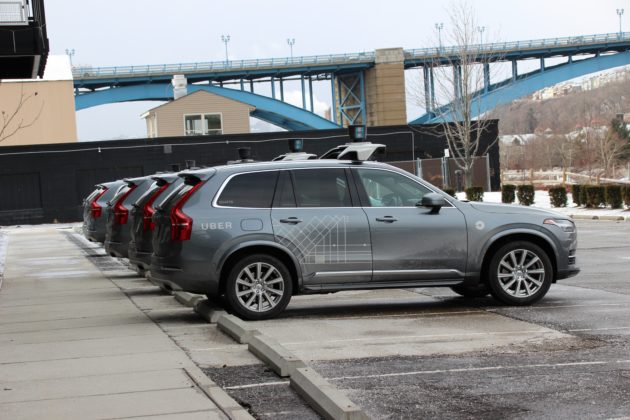
Autonomous Uber test vehicles at the Advanced Robotics Group in Pittsburgh. (GeekWire Photo / Taylor Soper)
The cost of owning a car could be less than traveling exclusively with rideshare services in Seattle and Denver by 2027, according to a new study by QuoteWizard.
Two commuters — one in Seattle and one in Denver — agreed to travel using only Uber and Lyft for a month to determine about how much it costs to get around that way. QuoteWizard compared that data with AAA’s estimated costs of personal car ownership and factored in the price reductions analysts expect to see when rideshare services adopt self-driving cars. QuoteWizard estimates that ridesharing will be cheaper than owning a car by 2027, assuming Uber and Lyft are operating autonomous fleets by that time.
QuoteWizard is a Seattle startup that operates an insurance marketplace for users to compare costs between companies.
The study estimates the current annual cost of traveling exclusively with Uber and Lyft is $13,963 in Seattle and $13,755 in Denver. QuoteWizard calculated those annual amounts by estimating the average price of a rideshare trip in Seattle to be $19.89 and in Denver, $19.59.
Lee Prindle, the Seattle worker who participated in the experiment, estimated that at least $5 of every $20 trip he took went to the driver, not including the percentage of fees drivers collect.
QuoteWizard subtracted that cost and reduced the per mile fee from $1.35 in Seattle to 35 cents, which some analysts estimate will be the cost when self-driving cars take over. QuoteWizard estimates that the average trip will go from $19.89 to $9.89. That brings the average annual cost to $6,943 in Seattle and $5,679 in Denver.
Both of those figures are less than the estimated cost of owning a car in 2027, which is $7,598.
But it’s important to recognize that the study is based on estimates from limited data sets and assumptions about how transportation will evolve over the decade. There are tons of variables in this space, particularly the safety of self-driving cars. Last month, Uber pulled its fleet of self-driving cars off streets in four test cities after a woman was fatally struck by one of the vehicles.
QuoteWizard acknowledges its “math experiment is not flawless.” It assumes that autonomous vehicles will be deployed in short order despite the safety issues that have been raised and expects competition between ridesharing companies to keep costs stable.
The study is also limited to cities where ridesharing is most feasible.
“Our experiment focuses on two urban areas – Seattle and Denver – for that exact reason,” Prindle writes. “It’ll take much more than a decade before it makes sense for someone in Wyoming, for example, to ditch their car.”
